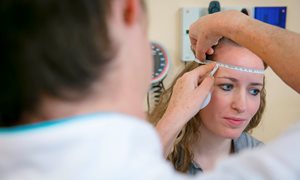
Technical innovation in genetic testing evolves so rapidly that new analysis of a genetic test from years ago is profitable. Immediately after the test, about one-third of patients with a rare genetic disorder receive a genetic diagnosis. After a new analysis five years later, more than half do. This is shown in a study by the Radboud University Medical Center published in Genome Medicine.
People with a rare disorder often have an error in their DNA that causes the disease. Doctors therefore map out their DNA sequence with a technique called ’exome sequencing’. Using clever software, they search for genes with such an error. In this way, a third of the patients receive a diagnosis right after analysis. If not, the advice to the patients is: come back in a few years.
‘Only half of the patients follow that advice and go back to the hospital’, says PhD student Gaby Schobers of the Department of Human Genetics of the Radboudumc. 'That's a pity, because we now show that a few years later, we can boost the number of diagnoses from 31% to 53% due to improved technology and increasing knowledge.'
Rapid developments
Schobers, together with pediatric neurologist Jolanda Schieving, followed 150 children with neurological disorders, such as epilepsy. Schobers: 'After the first test, 47 children immediately received a genetic diagnosis. All the others without a diagnosis, we followed up to five years after the initial test. Half of the patients came back into clinic themselves, as advised, the other half received a call. We first performed a new analysis on the old DNA data. If we still found nothing, we mapped the DNA again. In this way, an additional 32 patients received a genetic diagnosis.'
The researchers found more genetic errors because developments in genetics are moving at lightning speed. ‘Some genetic errors we had also found previously, but the genes at the time had not yet been linked to a particular disorder,' explains Lisenka Vissers, professor of translational genomics. 'In addition, improved software detects the errors in a better way, and also the technique of sequence analysis has been further developed. Thanks to better chemicals, we can now visualize pieces of DNA that were previously difficult to reach.’
Certainty at last
Although for some patients it has taken many years to find the diagnosis, it is still very valuable. ‘There may be medical consequences. Once a diagnosis has been uncovered, and it has become clear what is causing the patient's problems, it may now be possible to provide more personalized options for treatment and support', says Schieving. ‘But clarity and certainty on the cause of disease is also good for the patient. We often get very grateful reactions from parents of children who hear the cause of a disorder, even after years of searching for it.'
The researchers advise patients and their parents to return to clinic in time if a diagnosis has not yet been made. Schieving: 'We then look at the patient again. Sometimes there are new indications for a particular disorder. Then, thanks to a new analysis or DNA test, you may be able to find the genetic cause.' And what is the perspective for the remainder of patients who still did not receive a conclusive diagnosis? Vissers: 'We are now testing a more extensive DNA analysis, which not only looks at the genes, but also at the non-coding DNA sequence. Hopefully this will soon allow us to find even more genetic causes of disease’.
About the publication
This research was published in Genome Medicine: Reanalysis of exome negative patients with rare disease: a pragmatic workflow for diagnostic applications. Gaby Schobers*, Jolanda H. Schieving*, Helger G. Yntema, Maartje Pennings, Rolph Pfundt, Ronny Derks, Tom Hofste, Ilse de Wijs, Nienke Wieskamp, Simone van den Heuvel, Jordi Corominas Galbany, Christian Gilissen, Marcel Nelen, Han G. Brunner, Tjitske Kleefstra, Erik-Jan Kamsteeg, Michèl A.A.P. Willemsen*, Lisenka E.L.M. Vissers*.
-
Want to know more about these subjects? Click on the buttons below for more news.
More information
Annemarie Eek

wetenschapsvoorlichter






